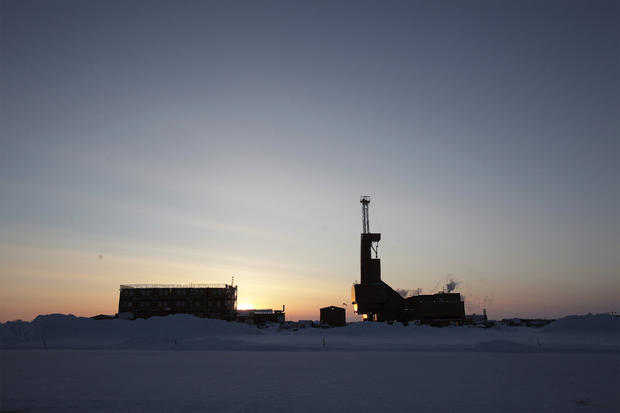The Biden administration has canceled one of the highest-profile oil and gas lease opportunities pending before the Department of the Interior. The decision, which halts the possibility of drilling for oil on more than 1 million acres in Alaska’s Cook Inlet, comes at a challenging political time, when gasoline prices are reaching painful new highs.
In a statement shared first with CBS News, the Department of the Interior cited a “lack of industry interest in leasing in the area” for the decision to “not go forward” with the Cook Inlet lease sale. The department also halted two leases under consideration for the Gulf of Mexico region due to “conflicting court rulings that affected work on these proposed lease sales.”
Federal law requires the Department of the Interior to adhere to a five-year lease plan for auctioning offshore leases. Management had until the end of the current five-year plan, which is set to expire at the end of next month, to complete these lease sales.
Lucas Jackson / REUTERS
Until now, the White House had been silent on the huge Alaskan lease. However, canceling the sale would be in keeping with political promises made by President Joe Biden in the name of stopping global warming. But those promises have become a political challenge to prices at gas stations.
“They don’t want to get beaten up by Republicans in light of high gas prices,” an environmental advocate told CBS News, speaking on condition of anonymity due to the sensitivity of the issue. “They are being killed in attacks based on inflation. The most visible sign of inflation is high gasoline prices.”
The delicate political situation was made clear after a top environmental official showed her hand in an email copied by a CBS News reporter. Gina McCarthy, the White House’s national climate adviser, wrote that “the Cook Inlet sale has been cancelled. It is not proceeding.”
Almost immediately, another White House official stepped in to declare that McCarthy went ahead. Interior Department officials said no final decision had been made. However, on Wednesday, when time was running out, the department made its announcement.
Frank Macchairola, a senior official with the American Petroleum Institute, the nation’s largest oil and gas trade association, called the cancellation of the Cook Inlet lease “yet another example of the administration’s lack of commitment to developing petroleum.” and gas in the United States”.
“The president has talked about the need for additional supplies in the market, but his administration has not taken steps to match that rhetoric,” Macchairola said, adding that politically “it would not play well.”
“In the kind of pricing environment we’re seeing, there are negative consequences to shutting down oil and gas development, both politically and practically,” he said.
On Wednesday, the national average price of regular gasoline hit an all-time high of $4.40, according to AAA.
For environmental groups, the decision was welcome news. Alaska’s offshore lease agreement would have opened up drilling opportunities over a span of more than 1 million acres for 40 or more years of production. The new activity would have given rise to new pipelines and subsea platforms in the environmentally sensitive area.
Drew Caputo, vice president of land, wildlife and ocean litigation at the environmental advocacy group Earthjustice, said it would be more than a decade before those leases could have had an impact on gas prices.
“It’s good for the climate, which can’t handle new oil and gas development,” Caputo said. “It’s good for Cook Inlet because offshore drilling is dangerous and disruptive. And it’s good for the people of Cook Inlet, including the natives, who appreciate the inlet in its natural state. So it’s a really good thing.”
Still, any decision that has worked against oil and gas interests carries political trade-offs. According to a recent CBS news poll, Mr. Biden’s approval rating is lowest when it comes to the economy and inflation, with 69% of those polled disapproving of his handling of inflation. Sixty-five percent of those surveyed said they believed the president “could do more” to lower gasoline prices.
American Petroleum Institute Senior Vice President Frank Macchiarola said in a statement: “Unfortunately, this is becoming a pattern: The administration talks about the need for more supply and acts to restrict it. As geopolitical volatility and prices Global energy prices continue to rise, I again urge the Administration to end the uncertainty and act immediately on a new five-year program for federal offshore leasing.”
But environmentalists argue that the climate issue is too important to get caught up in political battles.
“Scientists tell us that the time to switch from fossil fuel energy is not many years from now,” Caputo said. “It’s today. We need to end offshore oil leasing.”
Reference-www.cbsnews.com
